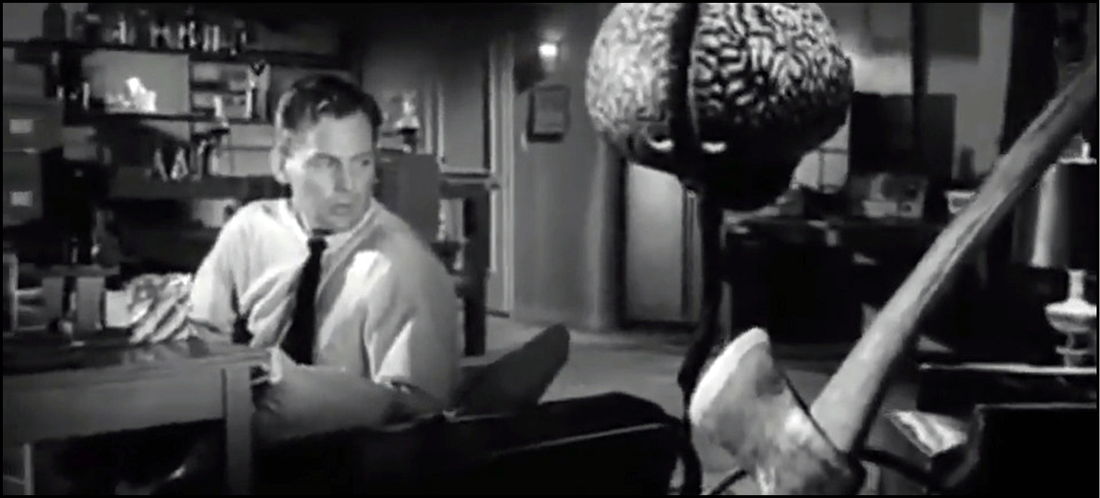(NOTE: The following review will contain minor spoilers necessary solely for the discussion of plot and/or characters. If you’re the type of reader who prefers a review entirely spoiler-free, then I’d encourage you to skip down to the last few paragraphs for the final assessment. If, however, you’re accepting of a few modest hints at ‘things to come,’ then read on …)
From the product packaging:
“An alien life-form arrives on Earth and crash lands in the California desert and takes refuge on Mystery Mountain. Renowned nuclear scientist Steve March, who works nearby, notices a strange proliferation of radiation coming from the mountains and decides to investigate. Little does he know the creature is a terrifying life-form from planet Arous determined to take over the Earth using subversive mind-control and has deliberately chosen Steve as its host!”
Huh.
Occasionally, I stumble across a film that – upon viewing – honestly leaves me with very little to say about it. Sure, I give it the ol’ sailor’s try – I mull it over, try to put the story in some context – and still, in the end, I’m left with very little substance on the topic. It’s rare, yes, but it does happen … and that’s the case with The Brain From Planet Arous (1957) from Marquette Productions, Ltd. A quick review of their IMDB.com profile shows that they only produced a scant three films – all in 1957 – and not a one of them truly made any lasting impact … well, except for the old SciFi trope of giant floating space brains, that is, which I’m guessing might be directly traced back to this very picture.
So if that’s one’s heritage, is it a bad thing?
Because I always assume these older pictures were intended by storytellers to be taken seriously, I find it difficult to reconcile some of this Brain’s thinking. For example, March (played with some surprising though campy range by John Agar) is introduced as one of the country’s premiere nuclear scientists, but the first thing he wants to do when he detects incredible waves of radiation coming from a nearby mountain is to run out there – with absolutely zero safety gear! – to investigate? Not only that, but he wants to drag his best buddy Dan Murphy (Robert Fuller) along for the ride? Have these two never heard about exposure? If that doesn’t give you pause, then how about once they begin receiving radiation readings higher than ever before on their Geiger counter their first impulse is to run toward it? That dangerous, deadly radiation? Really?
It’s almost as if screenwriter Ray Buffum put absolutely no thought into the subject because what truly mattered here were the giant floating alien space brains; perhaps he concluded well in advance that if the audience will accept those then why bother with a little deadly exposure? This was all set in the elusive Mystery Mountains – apparently near White Sands Proving Grounds in New Mexico – but as the film unspools we find that everyone and their mother’s uncle seems to know Mystery Mountains peaks and valleys intimately as no one has any trouble noticing the newly-formed cavern that – gasp! – wasn’t there last summer. It would seem that this distant and hard-to-find place may not have been as distant nor as hard-to-find as written.
Because the flick was produced in a different time and a different era, I rarely raise any quibbles with the portrayed social norms that might be a tad out-of-step with contemporary audiences. Certainly, we’ve evolved as a species, but men and women treated one another differently and behaved to different standards in the 1950’s; and these throwbacks are clearly a bit clunky seven (or so) decades later. But Gor (the villainous alien brain) behaves in an uncharacteristically amorous way when finally given access to some ‘sins of the flesh,’ and – while inhabiting March’s body – he gets awfully close to violating Hollywood standards of the day. Suffice it to say, Sally (Joyce Meadows) needed the luxury of a ‘safe space’ if ever a woman did!
Nathan Juran directed this curious space-aged potboiler, and it’s a name I’ve definitely heard before. A quick read of his IMDB.com profile shows that he definitely had a track record in genre, though this was one of his earlier pictures. The same year he brought the fondly remembered 20,000 Million Miles To Earth to the silver screen, he also directed this … so I’m guessing that other property occupied the lion’s share of the man’s attentive prowess. He’d go one to direct episodes of World Of Giants, Men Into Space, Voyage To The Bottom Of The Sea, The Time Tunnel, Lost In Space, and Land Of The Giants, a solid track record with SciFi and Fantasy’s a bit campier delights.
Otherwise … I’m still left with not much to make of the obviously dated effort. It’s hard to take much of it seriously, but I’d be a fool if I failed to point out that Agar’s work here is surprisingly good. He vacillates between good and evil with relative ease; and his handling of the mild-mannered scientist to the sex-crazed alien-infected potential overlord seethes enough menace to give just the right edge of a fellow in conflict. Heck, he even ends up saving the day – well, with more than a little help from his gal pal – even when Vol (the good guy floating alien space brain) promised he’d do the deed when the time came.
Score one for the Earthling, peeps.
In the interests of fairness, I’m pleased to disclose that the fine folks at Corinth Films provided me with a complimentary DVD of The Brain From Planet Arous (by request) for the expressed purposes of completing this review; and their contribution to me in no way, shape, or form influenced my opinion of it.
-- EZ


 RSS Feed
RSS Feed